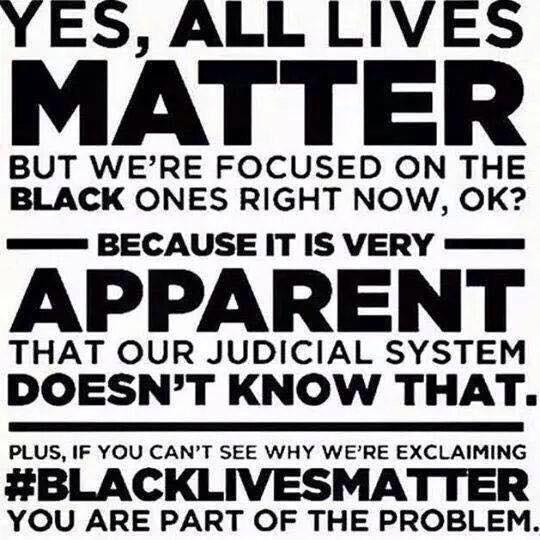Monday, August 21, 2017
Why "All lives matter" won't do . . .
If "all lives matter," then it follows that "black lives matter," and one would expect that those who believe that all lives matter would be more than willing to join in solidarity with those who believe that black lives matter. One can imagine demonstrations and gatherings in which signs with both slogans -- "All Lives Matter" and Black Lives Matter" -- would be proudly and harmoniously displayed. This hasn't happened. Instead the slogan "All Lives Matter" has been asserted as a challenge and a reproach to the "Black Lives Matter" (BLM) movement -- almost, in fact, a kind of argument against "Black Lives Matter." So, from the "All Lives Matter" people, instead of "Black lives matter? Yes, we'll join you in solidarity!" we're getting "Black lives matter? No! All lives matter. Now, shut up!" This isn't just a bad argument -- it isn't an argument at all.
What's going on here? I would argue that it's either an evasion or (more likely) a deliberate distraction. The leap from "black lives" to "all lives" -- that is, to a higher level of generality -- is a strategy to deny the validity of BLM's response to the particular realities of a historical moment in which citizens of color believe themselves vulnerable and undervalued to an extent that citizens should never be. But there's a real dishonesty, amounting to bad faith, in this All Lives Matter strategy. The argument against "Black Lives Matter" SHOULD seek to establish that black lives are not in fact as vulnerable or undervalued as many people of color seem to think. Establishing that would involve looking at things like the murder of Trayvon Martin (and his vigilante killer's acquittal), the shootings by police of unarmed and nonthreatening African-American young men (and the acquittal of many of these shooters too), the consistent efforts over almost eight years of people like Donald Trump and Sarah Palin to cast doubt upon the legitimacy of the Obama presidency (most notoriously, the "birther" movement), and the fact that Black men are disproportionately represented in American prisons (with the associated scandals of sub-standard legal representation and overturned convictions) -- looking at all that and trying to make the case that things aren't as bad as BLM seems to think. But to respond to these circumstances only with the slogan "All Lives Matter" is morally obtuse. Imagine a German Jew in 1934, say, arranging to distribute and post in the major cities thousands of handbills reading "Jewish Lives Matter." Josef Goebbels would have been on the radio the next night saying something like "All lives matter," and telling all Germans to rest easy in their beds. And we know what would have happened after that . . .
To citizens of color, what is frightening about their position is the fact that the institutions of society that exist to protect and guarantee their security as citizens -- mainly the police and the courts -- too often seem to be complicit in injustice. There are laws on the books and adjustments to the Constitution that go back beyond the days of 1960s Civil Rights legislation to the Reconstruction years following the Civil War, and yet here we are again, at a point where a Dylan Roof can slaughter Black Americans in a Charleston church, where a politician in North Carolina can admit that voting restrictions are designed to discourage African-Americans from exercising a constitutional right, and where an American President can claim to find "good people" among neo-Nazis and white supremacists. So it's hard to deny that we still have a long way to go, that "Black Lives Matter" needs to be asserted, and that a right-wing government that panders to the even-further-right needs to be shamed into an acknowledgment of the obvious.
Black lives, of course, aren't the only vulnerable lives, and the BLM movement has never claimed that ONLY black lives matter. (The image above, of a BLM poster, says it all.) The mostly white Americans in Appalachia and the mid-West who have been economically dislocated by changes in the energy sector of the economy and have seen frightening rises in poverty, addiction, and homelessness demand our sympathetic attention. If they wanted to march on Washington bearing placards saying that "Appalachian Lives Matter" or "Miners Matter," who could blame them? There is a difference, though, between the source of their vulnerability and that of people of color. The main one is that there are policy solutions to the problems of economic dislocation. These solutions would not be easy -- they would require massive investments, both public and private, in education, infrastructure, health care, housing support, and new economic incentives -- investments that would require a degree of political will and moral courage that the current Republican party (and too many Democrats) seems unable to muster. The situation that "Black Lives Matter" publicizes, however, isn't amenable to a programmatic solution. It's a matter of "hearts and minds." Racism is still with us and has proved all too easy to stir up. Only when more people who call themselves conservatives can find the moral backbone to declare solidarity with vulnerable Blacks will we have taken a first step -- and only a first step -- on a better way.
Subscribe to:
Post Comments (Atom)


No comments:
Post a Comment